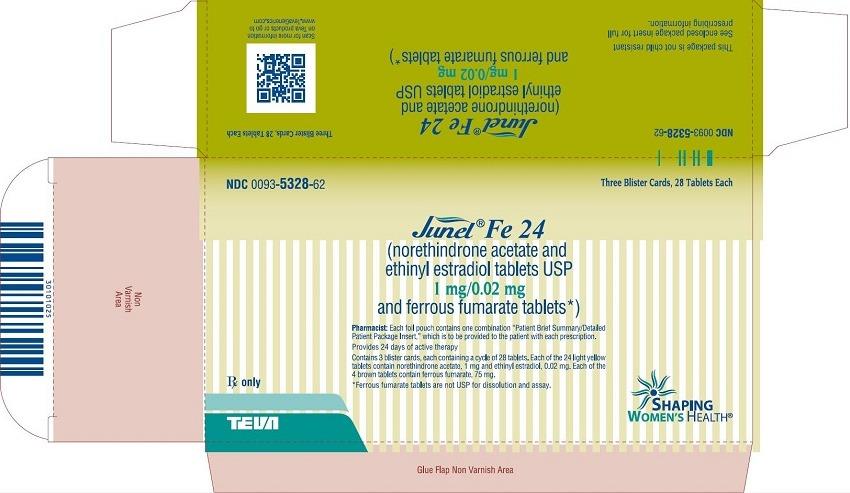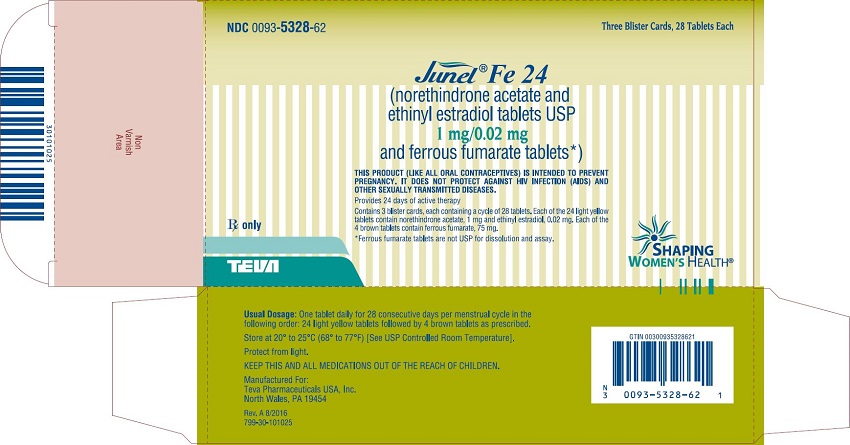FULL PRESCRIBING INFORMATION
WARNING: CIGARETTE SMOKING AND SERIOUS CARDIOVASCULAR EVENTS
Cigarette smoking increases the risk of serious cardiovascular events from combination oral contraceptive (COC) use. This risk increases with age, particularly in women over 35 years of age, and with the number of cigarettes smoked. For this reason, COCs should not be used by women who are over 35 years of age and smoke [see Contraindications (4)].
1 INDICATIONS AND USAGE
Junel® Fe 24 (norethindrone acetate and ethinyl estradiol tablets and ferrous fumarate tablets) is indicated for use by women to prevent pregnancy [see Clinical Studies (14)].
The efficacy of Junel Fe 24 in women with a body mass index (BMI) of >35 kg/m2 has not been evaluated.
2 DOSAGE AND ADMINISTRATION
2.1 How to Start Junel Fe 24
Junel Fe 24 is dispensed in a blister card [see How Supplied/Storage and Handling (16)]. Junel Fe 24 may be started using either a Day 1 start or a Sunday start (see Table 1). For the first cycle of a Sunday Start regimen, an additional method of contraception must be used until after the first 7 consecutive days of administration.
2.2 How to Take Junel Fe 24
Table 1: Instructions for Administration of Junel Fe 24
| Starting COCs in women not currently using hormonal contraception (Day 1 Start or Sunday Start) Important: Consider the possibility of ovulation and conception prior to initiation of this product. Tablet Color:
| Day 1 Start:
|
| Sunday Start: For each 28-day course, take in the following order:
|
|
| Switching to Junel Fe 24 from another oral contraceptive | Start on the same day that a new pack of the previous oral contraceptive would have started. |
| Switching from another contraceptive method to Junel Fe 24 | Start Junel Fe 24: |
|
|
|
|
|
|
|
|
|
|
Starting Junel Fe 24 after Abortion or Miscarriage
First-trimester
- After a first-trimester abortion or miscarriage, Junel Fe 24 may be started immediately. An additional method of contraception is not needed if Junel Fe 24 is started immediately.
- If Junel Fe 24 is not started within 5 days after termination of the pregnancy, the patient must use additional non-hormonal contraception (such as condoms and spermicide) for the first 7 days of her first 28-day course of Junel Fe 24.
Second-trimester
- Do not start until 4 weeks after a second-trimester abortion or miscarriage, due to the increased risk of thromboembolic disease. Start Junel Fe 24 following the instructions in Table 1 for Sunday start. Use additional non-hormonal contraception (such as condoms and spermicide) for the first 7 days of the patient’s first 28-day course of Junel Fe 24 [see Contraindications (4) and Warnings and Precautions (5.1)].
Starting Junel Fe 24 after Childbirth
- Do not start until 4 weeks after delivery, due to the increased risk of thromboembolic disease. Start contraceptive therapy with Junel Fe 24 following the instructions in Table 1 for women not currently using hormonal contraception.
- If the woman has not yet had a period postpartum, consider the possibility of ovulation and conception occurring prior to use of Junel Fe 24 [see Contraindications (4), Warnings and Precautions (5.1), Use in Specific Populations (8.1 and 8.2)].
2.3 Missed Tablets
Table 2: Instructions for Missed Junel Fe 24 Tablets
| Take the tablet as soon as possible. Take the next pill at the regular time and continue taking one tablet a day until the pack is finished. Back-up contraception is not needed. |
| Take the two missed tablets as soon as possible and the next two active tablets the next day. Continue taking one tablet a day until the pack is finished. Additional non-hormonal contraception (such as condoms and spermicide) must be used as back-up if the patient has sex within 7 days after missing tablets. |
| Day 1 Start: Throw out the rest of the pack and start a new pack that same day. Sunday Start: Continue taking one tablet a day until Sunday, then throw out the rest of the pack and start a new pack that same day. Additional non-hormonal contraception (such as condoms and spermicide) must be used as back-up if the patient has sex within 7 days after missing 3 tablets. |
2.4 Advice in Case of Gastrointestinal Disturbances
In case of severe vomiting or diarrhea, absorption may not be complete and additional contraceptive measures must be taken. If vomiting or diarrhea occurs within 3 to 4 hours after taking a light yellow tablet, handle this as a missed tablet [see Dosage and Administration (2.3)].
3 DOSAGE FORMS AND STRENGTHS
Junel Fe 24 (norethindrone acetate and ethinyl estradiol tablets USP, 1 mg/0.02 mg and ferrous fumarate tablets) is available in blister packs.
Each blister pack (28 tablets) contains in the following order:
- 24 light yellow, round, flat-faced, beveled-edge, unscored (active) tablets debossed with stylized b on one side and 977 on the other side and each containing 1 mg norethindrone acetate and 0.02 mg ethinyl estradiol.
- 4 brown, round, flat-faced, beveled-edge, unscored (non-hormonal inert) tablets debossed with stylized b on one side and 247 on the other side and each containing 75 mg ferrous fumarate. The ferrous fumarate tablets do not serve any therapeutic purpose.
4 CONTRAINDICATIONS
Junel Fe 24 is contraindicated in females who are known to have or develop the following conditions:
- A high risk of arterial or venous thrombotic diseases. Examples include women who are known to:
- Smoke, if over age 35 [see Boxed Warning and Warnings and Precautions (5.1)]
- Have deep vein thrombosis or pulmonary embolism, now or in the past [see Warnings and Precautions (5.1)]
- Have inherited or acquired hypercoagulopathies [see Warnings and Precautions (5.1)]
- Have cerebrovascular disease [see Warnings and Precautions (5.1)]
- Have coronary artery disease [see Warnings and Precautions (5.1)]
- Have thrombogenic valvular or thrombogenic rhythm diseases of the heart (for example, subacute bacterial endocarditis with valvular disease, or atrial fibrillation) [see Warnings and Precautions (5.1)]
- Have uncontrolled hypertension [see Warnings and Precautions (5.4)]
- Have diabetes mellitus with vascular disease [see Warnings and Precautions (5.6)]
- Have headaches with focal neurological symptoms or have migraine headaches with aura [see Warnings and Precautions (5.7)]
- Women over age 35 with any migraine headaches [see Warnings and Precautions (5.7)]
- Liver tumors, benign or malignant, or liver disease [see Warnings and Precautions (5.2)]
- Undiagnosed abnormal uterine bleeding [see Warnings and Precautions (5.8)]
- Current diagnosis of, or history of, breast cancer, which may be hormone sensitive [see Warnings and Precautions (5.11)]
- Use of Hepatitis C drug combinations containing ombitasvir/paritaprevir/ritonavir, with or without dasabuvir, due to the potential for ALT elevations [see Warnings and Precautions (5.3)]
5 WARNINGS AND PRECAUTIONS
5.1 Thrombotic Disorders and Other Vascular Problems
- Stop Junel Fe 24 if an arterial thrombotic event or venous thromboembolic (VTE) event occurs.
- Stop Junel Fe 24 if there is unexplained loss of vision, proptosis, diplopia, papilledema, or retinal vascular lesions. Evaluate for retinal vein thrombosis immediately [see Adverse Reactions (6.2)].
- If feasible, stop Junel Fe 24 at least 4 weeks before and through 2 weeks after major surgery or other surgeries known to have an elevated risk of VTE as well as during the following prolonged immobilization.
- Start Junel Fe 24 no earlier than 4 weeks after delivery, in women who are not breastfeeding. The risk of postpartum VTE decreases after the third postpartum week, whereas the risk of ovulation increases after the third postpartum week.
- The use of COCs increases the risk of VTE. However, pregnancy increases the risk of VTE as much or more than the use of COCs. The risk of VTE in women using COCs is 3 to 9 cases per 10,000 woman-years. The risk of VTE is highest during the first year of use of a COCs and when restarting oral contraception after a break of 4 weeks or longer. The risk of thromboembolic disease due to COCs gradually disappears after COC use is discontinued.
- Use of COCs also increases the risk of arterial thromboses such as strokes and myocardial infarctions, especially in women with other risk factors for these events. COCs have been shown to increase both the relative and attributable risks of cerebrovascular events (thrombotic and hemorrhagic strokes). This risk increases with age, particularly in women over 35 years of age who smoke.
- Use COCs with caution in women with cardiovascular disease risk factors.
5.2 Liver Disease
Impaired Liver Function
Do not use Junel Fe 24 in women with liver disease, such as acute viral hepatitis or severe (decompensated) cirrhosis of liver [see Contraindications (4)]. Acute or chronic disturbances of liver function may necessitate the discontinuation of COC use until markers of liver function return to normal and COC causation has been excluded. Discontinue Junel Fe 24 if jaundice develops.
Liver Tumors
Junel Fe 24 is contraindicated in women with benign and malignant liver tumors [see Contraindications (4)]. Hepatic adenomas are associated with COC use. An estimate of the attributable risk is 3.3 cases per 100,000 COC users. Rupture of hepatic adenomas may cause death through intra-abdominal hemorrhage.
Studies have shown an increased risk of developing hepatocellular carcinoma in long-term (>8 years) COC users. However, the risk of liver cancers in COC users is less than one case per million users.
5.3 Risk of Liver Enzyme Elevations with Concomitant Hepatitis C Treatment
During clinical trials with the Hepatitis C combination drug regimen that contains ombitasvir/paritaprevir/ritonavir, with or without dasabuvir, ALT elevations greater than 5 times the upper limit of normal (ULN), including some cases greater than 20 times the ULN, were significantly more frequent in women using ethinyl estradiol-containing medications, such as COCs. Discontinue Junel Fe 24 prior to starting therapy with the combination drug regimen ombitasvir/paritaprevir/ritonavir, with or without dasabuvir [see Contraindications (4)]. Junel Fe 24 can be restarted approximately 2 weeks following completion of treatment with the Hepatitis C combination drug regimen.
5.4 High Blood Pressure
Junel Fe 24 is contraindicated in women with uncontrolled hypertension or hypertension with vascular disease [see Contraindications (4)]. For women with well-controlled hypertension, monitor blood pressure and stop Junel Fe 24 if blood pressure rises significantly.
An increase in blood pressure has been reported in women taking COCs, and this increase is more likely in older women with extended duration of use. The incidence of hypertension increases with increasing concentrations of progestin.
5.5 Gallbladder Disease
Studies suggest a small increased relative risk of developing gallbladder disease among COC users. Use of COCs may worsen existing gallbladder disease. A past history of COC-related cholestasis predicts an increased risk with subsequent COC use. Women with a history of pregnancy-related cholestasis may be at an increased risk for COC related cholestasis.
5.6 Carbohydrate and Lipid Metabolic Effects
Carefully monitor prediabetic and diabetic women who are taking Junel Fe 24. COCs may decrease glucose tolerance.
Consider alternative contraception for women with uncontrolled dyslipidemias. A small proportion of women will have adverse lipid changes while on COCs.
Women with hypertriglyceridemia, or a family history thereof, may be at an increased risk of pancreatitis when using COCs.
5.7 Headache
If a woman taking Junel Fe 24 develops new headaches that are recurrent, persistent, or severe, evaluate the cause and discontinue Junel Fe 24 if indicated.
Consider discontinuation of Junel Fe 24 in the case of increased frequency or severity of migraine during COC use (which may be prodromal of a cerebrovascular event).
5.8 Bleeding Irregularities and Amenorrhea
Unscheduled Bleeding and Spotting
Unscheduled (breakthrough or intracyclic) bleeding and spotting sometimes occur in patients on COCs, especially during the first three months of use. If bleeding persists or occurs after previously regular cycles, check for causes such as pregnancy or malignancy. If pathology and pregnancy are excluded, bleeding irregularities may resolve over time or with a change to a different contraceptive product.
In a clinical trial of Junel Fe 24, the frequency and duration of unscheduled bleeding and/or spotting was assessed in 743 women (3,823 28-day cycles). A total of 10 subjects (1.3%) discontinued Junel Fe 24, at least in part, due to bleeding or spotting. Based on data from the clinical trial, [24 to 38%] of women using Junel Fe 24 experienced unscheduled bleeding per cycle in the six months of the trial. The percent of women who experienced unscheduled bleeding tended to decrease over time.
Amenorrhea and Oligomenorrhea
Women who use Junel Fe 24 may experience absence of withdrawal bleeding, even if they are not pregnant. In the clinical trial with Junel Fe 24, 31 to 41% of the women using Junel Fe 24 did not have a withdrawal menses in at least one of 6 cycles of use.
Some women may experience amenorrhea or oligomenorrhea after discontinuation of COCs, especially when such a condition was preexistent.
If scheduled (withdrawal) bleeding does not occur, consider the possibility of pregnancy. If the patient has not adhered to the prescribed dosing schedule (missed one or more active tablets or started taking them on a day later than she should have), consider the possibility of pregnancy at the time of the first missed period and take appropriate diagnostic measures. If the patient has adhered to the prescribed regimen and misses two consecutive periods, rule out pregnancy.
5.9 COC Use Before or During Early Pregnancy
Extensive epidemiologic studies have revealed no increased risk of birth defects in women who have used oral contraceptives prior to pregnancy. Studies also do not suggest a teratogenic effect, particularly in so far as cardiac anomalies and limb reduction defects are concerned, when oral contraceptives are taken inadvertently during early pregnancy. Discontinue Junel Fe 24 use if pregnancy is confirmed.
Administration of COCs to induce withdrawal bleeding should not be used as a test for pregnancy [see Use in Specific Populations (8.1)].
5.10 Depression
Carefully observe women with a history of depression and discontinue Junel Fe 24 if depression recurs to a serious degree.
5.11 Malignant Neoplasms
Breast Cancer
Junel Fe 24 is contraindicated in women who currently have or have had breast cancer because breast cancer may be hormonally-sensitive [see Contraindications (4)].
Epidemiology studies have not found a consistent association between use of combined oral contraceptives (COCs) and breast cancer risk. Studies do not show an association between ever (current or past) use of COCs and risk of breast cancer. However, some studies report a small increase in the risk of breast cancer among current or recent users (<6 months since last use) and current users with longer duration of COC use [see Postmarketing Experience (6.2)].
Cervical Cancer
Some studies suggest that COCs are associated with an increase in the risk of cervical cancer or intraepithelial neoplasia. However, there is controversy about the extent to which these findings may be due to differences in sexual behavior and other factors.
5.12 Effect on Binding Globulins
The estrogen component of COCs may raise the serum concentrations of thyroxine-binding globulin, sex hormone-binding globulin, and cortisol-binding globulin. The dose of replacement thyroid hormone or cortisol therapy may need to be increased.
5.13 Monitoring
A woman who is taking COCs should have a yearly visit with her healthcare provider for a blood pressure check and for other indicated healthcare.
6 ADVERSE REACTIONS
The following serious adverse reactions with the use of COCs are discussed elsewhere in the labeling:
- Serious cardiovascular events and stroke [see Boxed Warning and Warnings and Precautions (5.1)]
- Vascular events [see Warnings and Precautions (5.1)]
- Liver disease [see Warnings and Precautions (5.2)]
Adverse reactions commonly reported by COC users are:
- Irregular uterine bleeding
- Nausea
- Breast tenderness
- Headache
6.1 Clinical Trial Experience
Because clinical trials are conducted under widely varying conditions, adverse reaction rates observed in the clinical trials of a drug cannot be directly compared to the rates in the clinical trials of another drug and may not reflect the rates observed in practice.
The safety of Junel Fe 24 was evaluated in 743 subjects who participated in an open-label, randomized, active-controlled, multicenter clinical trial of Junel Fe 24 for contraception. This trial examined healthy, non-pregnant volunteers aged 18 to 45 years, who were sexually active and had a body mass index of ≤ 35 kg/m2. Subjects were followed for up to six 28-day cycles providing a total of 3,823 treatment-cycles of exposure.
Common Adverse Reactions (≥ 2% of all subjects): The most common adverse reactions reported by at least 2% of the 743 women using Junel Fe 24 were the following, in order of decreasing incidence: headache (6.3%), vaginal candidiasis (6.1%), nausea (4.6%), menstrual cramps (4.4%), breast tenderness (3.4%), mood changes (including mood swings (2.2%) and depression (1.1%), bacterial vaginitis (3.1%), acne (2.7%), and weight gain (2.0%).
Adverse Reactions Leading to Study Discontinuation: Among the 743 women using Junel Fe 24, 46 women (6.2%) withdrew because of an adverse event. Adverse events occurring in 3 or more subjects leading to discontinuation of treatment were, in decreasing order: abnormal bleeding (0.9%), nausea (0.8%), mood changes (0.8%), menstrual cramps (0.4%), increased blood pressure (0.4%), and irregular bleeding (0.4%).
6.2 Postmarketing Experience
Five studies that compared breast cancer risk between ever-users (current or past use) of COCs and never-users of COCs reported no association between ever use of COCs and breast cancer risk, with effect estimates ranging from 0.90 to 1.12 (Figure 1).
Three studies compared breast cancer risk between current or recent COC users (<6 months since last use) and never users of COCs (Figure 1). One of these studies reported no association between breast cancer risk and COC use. The other two studies found an increased relative risk of 1.19 to 1.33 with current or recent use. Both of these studies found an increased risk of breast cancer with current use of longer duration, with relative risks ranging from 1.03 with less than one year of COC use to approximately 1.4 with more than 8 to 10 years of COC use.
Figure 1: Relevant Studies of Risk of Breast Cancer with Combined Oral Contraceptives
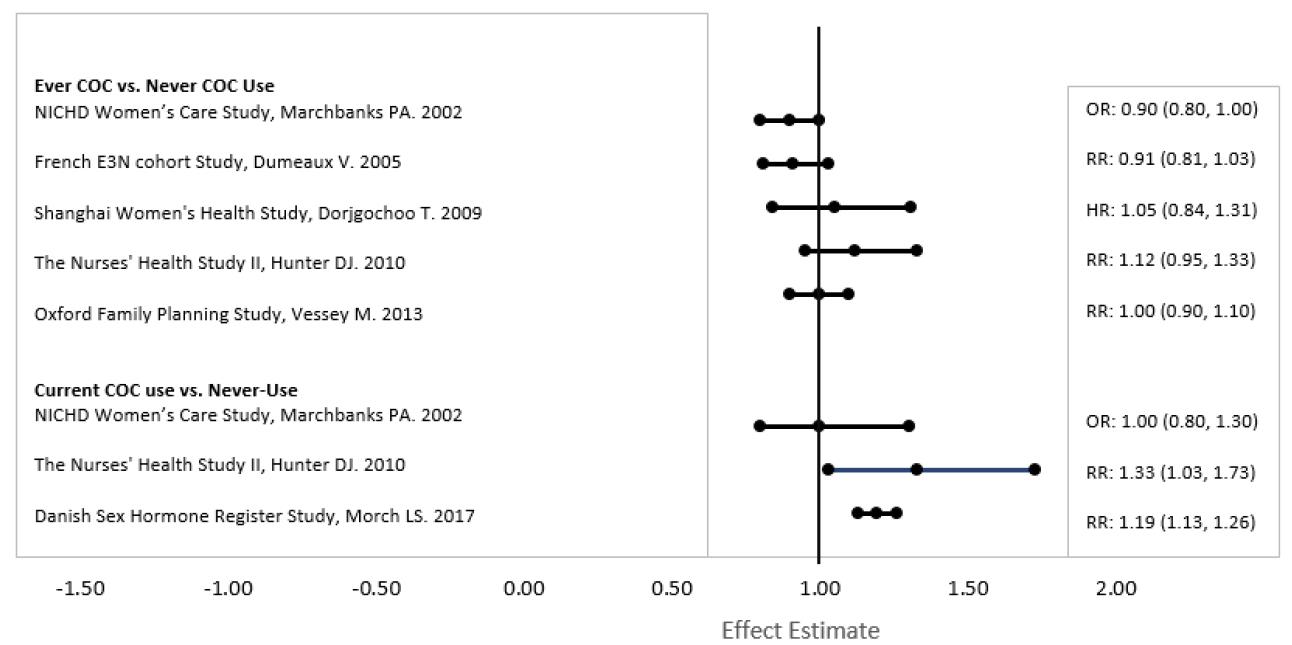
RR = relative risk; OR = odds ratio; HR = hazard ratio. “ever COC” are females with current or past COC use; “never COC use” are females that never used COCs.
The following adverse reactions have been identified during post approval use of Junel Fe 24. Because these reactions are reported voluntarily from a population of uncertain size, it is difficult to reliably estimate their frequency or evaluate a causal relationship to drug exposure.
Cardiovascular: chest pain, palpitations, tachycardia, angina pectoris, myocardial infarction.
Endocrine disorders: hypothyroidism, hyperthyroidism.
Eye disorders: blurred vision, visual impairment, transient blindness, corneal thinning, change in corneal curvature (steepening).
GI disorders: nausea, vomiting, abdominal pain, constipation, pancreatitis.
Hepatobiliary disorders: cholelithiasis, cholecystitis, hepatic adenoma, hemangioma of liver.
Immune system disorders: anaphylactic reactions, including urticaria, angioedema, and severe reactions with respiratory and circulatory symptoms.
Infections: vaginal infection.
Metabolism and nutrition disorders: change in weight or appetite (increase or decrease).
hypoglycemia, diabetes mellitus, anemia.
Musculoskeletal and connective tissue disorders: myalgia.
Skin and subcutaneous disorders: alopecia, rash (generalized and allergic), pruritus, skin discoloration, night sweats, swelling face or lips, hirsutism, skin burning sensation, erythema multiforme, erythema nodosum, hemorrhagic eruption.
Nervous system disorders: headache, dizziness, migraine, hyperesthesia, paraesthesia, hypoaesthesia, somnolence, loss of consciousness, sensory disturbance.
Psychiatric disorders: mood swings, depression, insomnia, anxiety, suicidal ideation, panic attack, changes in libido, bipolar disorder, dissociation, homicidal ideation.
Renal and urinary disorders: pollakiuria, dysuria, cystitis-like syndrome.
Reproductive system and breast disorders: breast changes (tenderness, pain, enlargement, and secretion), premenstrual syndrome, ovarian cyst, pelvic pain, ovarian cyst ruptured, pelvic fluid collection.
Vascular disorders: hot flush, thrombosis/embolism (coronary artery, pulmonary, cerebral, deep vein), migraine, transient ischemic attack, ischemic stroke.
7 DRUG INTERACTIONS
Consult the labeling of concurrently used drugs to obtain further information about interactions with oral contraceptives or the potential for enzyme alterations.
7.1 Effects of Other Drugs on Combined Oral Contraceptives
Substances decreasing the plasma concentrations of COCs and potentially diminishing the efficacy of COCs:
Drugs or herbal products that induce certain enzymes, including cytochrome P450 3A4 (CYP3A4), may decrease the plasma concentrations of COCs and potentially diminish the effectiveness of COCs or increase breakthrough bleeding. Some drugs or herbal products that may decrease the effectiveness of oral contraceptives including phenytoin, barbiturates, carbamazepine, bosentan, felbamate, griseofulvin, oxcarbazepine, rifampicin, topiramate, rifabutin, rufinamide, aprepitant, and products containing St. John’s wort. Interactions between COCs and other drugs may lead to breakthrough bleeding and/or contraceptive failure. Counsel women to use an alternative method of contraception or a back-up method when enzyme inducers are used with COCs, and to continue back-up contraception for 28 days after discontinuing the enzyme inducer to ensure contraceptive reliability.
Substances increasing the plasma concentrations of COCs:
Coadministration of atorvastatin or rosuvastatin and certain COCs containing ethinyl estradiol (EE) increase AUC values for EE by approximately 20 to 25%. Ascorbic acid and acetaminophen may increase plasma EE concentrations, possibly by inhibition of conjugation. CYP3A4 inhibitors such as itraconazole, voriconazole, fluconazole, grapefruit juice, or ketoconazole may increase plasma hormone concentrations.
Human immunodeficiency virus (HIV)/Hepatitis C virus (HCV) protease inhibitors and non-nucleoside reverse transcriptase inhibitors:
Significant changes (increase or decrease) in the plasma concentrations of estrogen and/or progestin have been noted in some cases of coadministration with HIV protease inhibitors (decrease [e.g., nelfinavir, ritonavir, darunavir/ritonavir, (fos)amprenavir/ritonavir, lopinavir/ritnoavir, and tipranavir/ritonavir] or increase [e.g., indinavir and atazanavir/ritonavir])/HCV protease inhibitors or with non-nucleoside reverse transcriptase inhibitors (decrease [e.g., nevirapine] or increase [e.g., etravirine]).
7.2 Effects of Combined Oral Contraceptives on Other Drugs
COCs containing EE may inhibit the metabolism of other compounds (e.g., cyclosporine, prednisolone, theophylline, tizanidine, and voriconazole) and increase their plasma concentrations. COCs have been shown to decrease plasma concentrations of acetaminophen, clofibric acid, morphine, salicylic acid, and temazepam. Significant decrease in plasma concentration of lamotrigine has been shown, likely due to induction of lamotrigine glucuronidation. This may reduce seizure control; therefore, dosage adjustments of lamotrigine may be necessary.
Women on thyroid hormone replacement therapy may need increased doses of thyroid hormone because the serum concentration of thyroid-binding globulin increases with use of COCs [see Warnings and Precautions (5.12)].
7.3 Concomitant Use with HCV Combination Therapy – Liver Enzyme Elevation
Coadministration of Junel Fe 24 with HCV drug combinations containing ombitasvir/paritaprevir/ritonavir, with or without dasabuvir is contraindicated due to potential for ALT elevations [see Warnings and Precautions (5.3)]. Coadministration of Junel Fe 24 and glecaprevir/pibrentasvir is not recommended due to potential for ALT elevations.
8 USE IN SPECIFIC POPULATIONS
8.1 Pregnancy
Risk Summary
There is no use for contraception in pregnancy; therefore, Junel Fe 24 should be discontinued during pregnancy. Epidemiologic studies and meta-analyses have not found an increased risk of genital or nongenital birth defects (including cardiac anomalies and limb-reduction defects) following exposure to CHCs before conception or during early pregnancy.
In the U.S. general population, the estimated background risk of major birth defects and miscarriage in clinically recognized pregnancies is 2 to 4 percent and 15 to 20 percent, respectively.
Data
Human Data
Epidemiologic studies and meta-analyses have not found an increased risk of genital or nongenital birth defects (including cardiac anomalies and limb-reduction defects) following exposure to CHCs before conception or during early pregnancy.
8.2 Lactation
Risk Summary
Contraceptive hormones and/or metabolites are present in human milk. CHCs can reduce milk production in breastfeeding females. This reduction can occur at any time but is less likely to occur once breastfeeding is well-established. When possible, advise the nursing female to use other methods of contraception until she discontinues breastfeeding [see Dosage and Administration (2.2).] The developmental and health benefits of breastfeeding should be considered along with the mother’s clinical need for norethindrone acetate and ethinyl estradiol tablets and ferrous fumarate tablets and any potential adverse effects on the breastfed child from norethindrone acetate and ethinyl estradiol tablets and ferrous fumarate tablets or from the underlying maternal condition.
8.4 Pediatric Use
Safety and efficacy of Junel Fe 24 have been established in women of reproductive age. Efficacy is expected to be the same in postpubertal adolescents under the age of 18 years as for users 18 years and older. Use of this product before menarche is not indicated.
8.5 Geriatric Use
Junel Fe 24 has not been studied in postmenopausal women and is not indicated in this population.
8.6 Hepatic Impairment
The pharmacokinetics of Junel Fe 24 has not been studied in subjects with hepatic impairment. However, steroid hormones may be poorly metabolized in patients with hepatic impairment. Acute or chronic disturbances of liver function may necessitate the discontinuation of COC use until markers of liver function return to normal and COC causation has been excluded [see Contraindications (4) and Warnings and Precautions (5.2)].
8.7 Renal Impairment
The pharmacokinetics of Junel Fe 24 has not been studied in women with renal impairment.
8.8 Body Mass Index
The safety and efficacy of Junel Fe 24 in women with a body mass index (BMI) > 35 kg/m2 has not been evaluated [see Clinical Studies (14)].
10 OVERDOSAGE
There have been no reports of serious ill effects from overdose of oral contraceptives, including ingestion by children. Overdosage may cause withdrawal bleeding in females and nausea.
11 DESCRIPTION
Junel® Fe 24 (norethindrone acetate and ethinyl estradiol tablets USP and ferrous fumarate tablets) is a combination oral contraceptive for oral administration consisting of active tablets containing norethindrone acetate, USP, a progestin, and ethinyl estradiol, USP, an estrogen, and inert tablets containing ferrous fumarate, which serve no therapeutic purpose.
- Each active light yellow tablet contains 1 mg norethindrone acetate, USP and 0.02 mg ethinyl estradiol, USP. Each light yellow tablet also contains the following inactive ingredients: acacia, compressible sugar, D&C yellow no. 10 aluminum lake, lactose monohydrate, magnesium stearate and pregelatinized corn starch.
- Each inert brown tablet contains 75 mg ferrous fumarate, crospovidone, hydrogenated vegetable oil and microcrystalline cellulose. The ferrous fumarate tablets do not serve any therapeutic purpose. Ferrous fumarate tablets are not USP for dissolution and assay.
The chemical name of ethinyl estradiol, USP is 19-nor-17α-pregna-1,3,5(10)-trien-20-yne-3,17-diol, and the structural formula is:
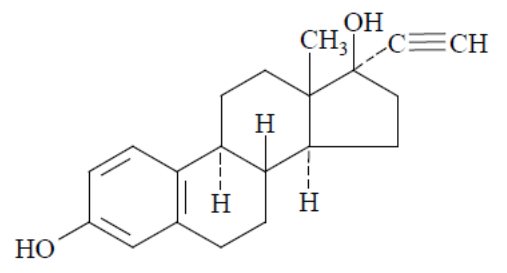
C20H24O2 M.W. 296.40
The chemical name of norethindrone acetate, USP is 17-hydroxy-19-nor-17α-pregn-4-en-20-yn-3-one acetate, and the structural formula is:
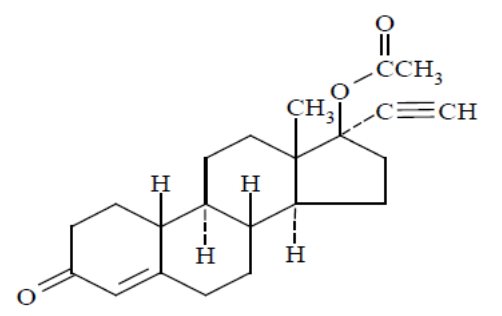
C22H28O3 M.W. 340.46
12 CLINICAL PHARMACOLOGY
12.3 Pharmacokinetics
Absorption
Norethindrone acetate appears to be completely and rapidly deacetylated to norethindrone after oral administration, because the disposition of norethindrone acetate is indistinguishable from that of orally administered norethindrone. Norethindrone acetate and ethinyl estradiol are rapidly absorbed from Junel Fe 24 tablets, with maximum plasma concentrations of norethindrone and ethinyl estradiol occurring 1 to 4 hours postdose. Both are subject to first-pass metabolism after oral dosing, resulting in an absolute bioavailability of approximately 64% for norethindrone and 43% for ethinyl estradiol.
The plasma norethindrone and ethinyl estradiol pharmacokinetics following single- and multiple-dose administrations of Junel Fe 24 tablets in 17 healthy female volunteers are provided in Figures 2 and 3, and Table 3.
Following multiple-dose administration of Junel Fe 24 tablets, mean maximum concentrations of norethindrone and ethinyl estradiol were increased by 95% and 27%, respectively, as compared to single-dose administration. Mean norethindrone and ethinyl estradiol exposures (AUC values) were increased by 164% and 51% respectively, as compared to single-dose administration of Junel Fe 24 tablets.
Steady-state with respect to norethindrone was reached by Day 17 and steady-state with respect to ethinyl estradiol was reached by Day 13.
Mean SHBG concentrations were increased by 150% from baseline (57.5 nmol/L) to 144 nmol/L at steady-state.
Figure 2. Mean Plasma Norethindrone Concentration-Time Profiles Following Single- and Multiple-Dose Oral Administration of Junel Fe 24 Tablets to Healthy Female Volunteers Under Fasting Condition (n = 17)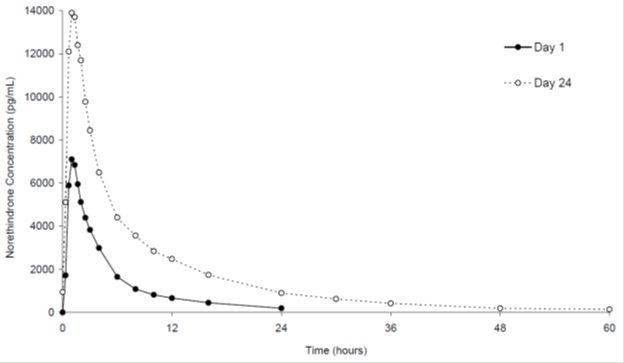
Figure 3. Mean Plasma Ethinyl Estradiol Concentration-Time Profiles Following Single- and Multiple-Dose Oral Administration of Junel Fe 24 Tablets to Healthy Female Volunteers Under Fasting Condition (n = 17)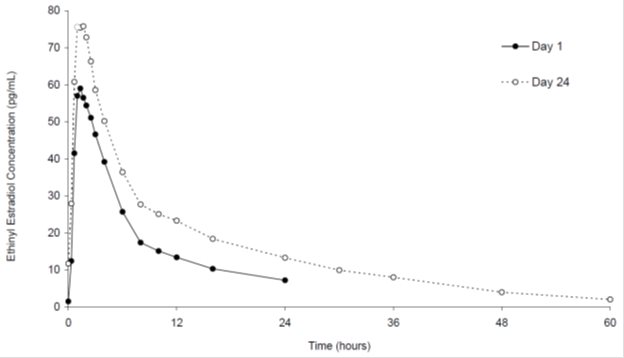
Table 3. Summary of Norethindrone (NE) and Ethinyl Estradiol (EE) Pharmacokinetics Following Single- and Multiple-Dose Oral Administration of Junel Fe 24 Tablets to Healthy Female Volunteers Under Fasting Condition (n = 17)
|
Regimen |
Analyte |
Arithmetic Meana (% CV) by Pharmacokinetic Parameter |
|||||
|
Cmax (pg/mL) |
tmax (hr) |
AUC(0−24) (pg/mL•h) |
Cmin (pg/mL) |
t½ (hr) |
Cavg (pg/mL) |
||
|
Day 1 (Single Dose) |
NE |
8420 (31) |
1.0 (0.7 to 4.0) |
33390 (40) |
-- |
-- |
-- |
|
EE |
64.5 (27) |
1.3 (0.7 to 4.0) |
465.4 (26) |
-- |
-- |
-- |
|
|
SHBG |
-- |
-- |
-- |
57.5 (37)b |
-- |
-- |
|
|
Day 24 (Multiple Dose) |
NE |
16400 (26) |
1.3 (0.7 to 4.0) |
88160 (30) |
880 (51) |
8.4 |
3670 (30) |
|
EE |
81.9 (24) |
1.7 (1.0 to 2.0) |
701.3 (28) |
11.4 (43) |
14.5 |
29.2 (28) |
|
|
SHBG |
-- |
-- |
-- |
144 (24) |
-- |
-- |
|
|
Cmax = Maximum plasma concentration |
|||||||
Food Effect
A single-dose administration of Junel Fe 24 tablet with food decreased the maximum concentration of norethindrone by 11% and increased the extent of absorption by 27% and decreased the maximum concentration of ethinyl estradiol by 30% but not the extent of absorption.
Distribution
Volume of distribution of norethindrone and ethinyl estradiol ranges from 2 to 4 L/kg. Plasma protein binding of both steroids is extensive (>95%); norethindrone binds to both albumin and SHBG, whereas ethinyl estradiol binds only to albumin. Although ethinyl estradiol does not bind to SHBG, it induces SHBG synthesis.
Metabolism
Norethindrone undergoes extensive biotransformation, primarily via reduction, followed by sulfate and glucuronide conjugation. The majority of metabolites in the circulation are sulfates, with glucuronides accounting for most of the urinary metabolites.
Ethinyl estradiol is also extensively metabolized, both by oxidation and by conjugation with sulfate and glucuronide. Sulfates are the major circulating conjugates of ethinyl estradiol and glucuronides predominate in urine. The primary oxidative metabolite is 2-hydroxy ethinyl estradiol, formed by the CYP3A4 isoform of cytochrome P450. Part of the first-pass metabolism of ethinyl estradiol is believed to occur in gastrointestinal mucosa. Ethinyl estradiol may undergo enterohepatic circulation.
Excretion
Norethindrone and ethinyl estradiol are excreted in both urine and feces, primarily as metabolites. Plasma clearance values for norethindrone and ethinyl estradiol are similar (approximately 0.4 L/hr/kg). Steady-state elimination half-lives of norethindrone and ethinyl estradiol following administration of Junel Fe 24 tablets are approximately 8 hours and 14 hours, respectively.
14 CLINICAL STUDIES
In an active-controlled clinical trial, 743 women 18 to 45 years of age were studied to assess the efficacy of Junel Fe 24, for up to six 28-day cycles. The racial demographic of women randomized to Junel Fe 24 was: 69.5% Caucasian, 15.5% African-American, 10.4% Hispanic, 2.3% Asian and 2.3% Native American/Other. Women with body mass index (BMI) greater than 35 mg/m2 were excluded from the study. The weight range for those women treated was 90 to 260 pounds, with a mean weight of 147 pounds. Among the women in the study randomized to Junel Fe 24, 38.9% had not used hormonal contraception immediately prior to enrolling in this study.
A total of 583 women completed 6 cycles of treatment. There were a total of 5 on-treatment pregnancies among women aged 18 to 45 years in 3,565 treatment cycles during which no back-up contraception was used. The Pearl Index for Junel Fe 24 was 1.82 (95% confidence interval 0.59 to 4.25).
16 HOW SUPPLIED/STORAGE AND HANDLING
16.1 How Supplied
Junel® Fe 24 (norethindrone acetate and ethinyl estradiol tablets USP, 1 mg/0.02 mg and ferrous fumarate tablets*) is available only in 28 tablets and packaged in cartons of 3 blister cards of 28 tablets each.
NDC 0093-5328-62 Cartons of 3 blister cards (dispensers)
Each blister card contains in the following order:
- 24 light yellow, round, flat-faced, beveled-edge, unscored (active) tablets debossed with stylized b on one side and 977 on the other side and each containing 1 mg norethindrone acetate, USP and 0.02 mg ethinyl estradiol, USP.
- 4 brown, round, flat-faced, beveled-edge, unscored (non-hormonal inert) tablets debossed with stylized b on one side and 247 on the other side and each containing 75 mg ferrous fumarate. The ferrous fumarate tablets do not serve any therapeutic purpose.
*Ferrous fumarate tablets are not USP for dissolution and assay.
17 PATIENT COUNSELING INFORMATION
Counsel patients to read the FDA-approved Patient Labeling (Patient Information and Instructions for Use).
Counsel patients about the following information:
- Cigarette smoking increases the risk of serious cardiovascular events from COC use, and that women who are over 35 years old and smoke should not use COCs [see Boxed Warning].
- Increased risk of VTE compared to non-users of COCs is greatest after initially starting a COC or restarting (following a 4-week or greater pill-free interval) the same or a different COC [see Warnings and Precautions (5.1)].
- Junel Fe 24 does not protect against HIV infection (AIDS) and other sexually transmitted diseases.
- Junel Fe 24 is not to be used during pregnancy; if pregnancy occurs during use of Junel Fe 24 instruct the patient to stop further use [see Warnings and Precautions (5.9)].
- Take one tablet daily by mouth at the same time every day. Instruct patients what to do in the event pills are missed [see Dosage and Administration (2.2)].
- Use a back-up or alternative method of contraception when enzyme inducers are used with Junel Fe 24 [see Drug Interactions (7.1)].
- COCs may reduce breast milk production; this is less likely to occur if breastfeeding is well established [see Use in Specific Populations (8.2)].
- Women who start COCs postpartum, and who has not yet had a period, must use an additional method of contraception until she has taken a light yellow tablet for 7 consecutive days [see Dosage and Administration (2.2)].
- Amenorrhea may occur. Consider pregnancy in the event of amenorrhea at the time of the first missed period. Rule out pregnancy in the event of amenorrhea in two or more consecutive cycles [see Warnings and Precautions (5.8)].
Manufactured For:
Teva Pharmaceuticals USA, Inc.
North Wales, PA 19454
Rev. E 2/2024
PATIENT INFORMATION
Junel Fe 24 (Joo-nell Fe 24)
(norethindrone acetate and ethinyl estradiol tablets and ferrous fumarate tablets)
What is the most important information I should know about Junel Fe 24?
Do not use Junel Fe 24 if you smoke cigarettes and are over 35 years old. Smoking increases your risk of serious cardiovascular side effects from hormonal birth control pills, including death from heart attack, blood clots or stroke. This risk increases with age and the number of cigarettes you smoke.
What is Junel Fe 24?
Junel Fe 24 is a birth control pill (hormonal contraceptive) used by women to prevent pregnancy.
How does Junel Fe work for contraception?
Your chance of getting pregnant depends on how well you follow the directions for taking your birth control pills. The better you follow the directions, the less chance you have of getting pregnant.
Based on the results from the clinical study, about 1 to 4 out of 100 women may get pregnant during the first year they use Junel Fe 24.
The following chart shows the chance of getting pregnant for women who use different methods of birth control. Each box on the chart contains a list of birth control methods that are similar in effectiveness. The most effective methods are at the top of the chart. The box on the bottom of the chart shows the chance of getting pregnant for women who do not use birth control and are trying to get pregnant.
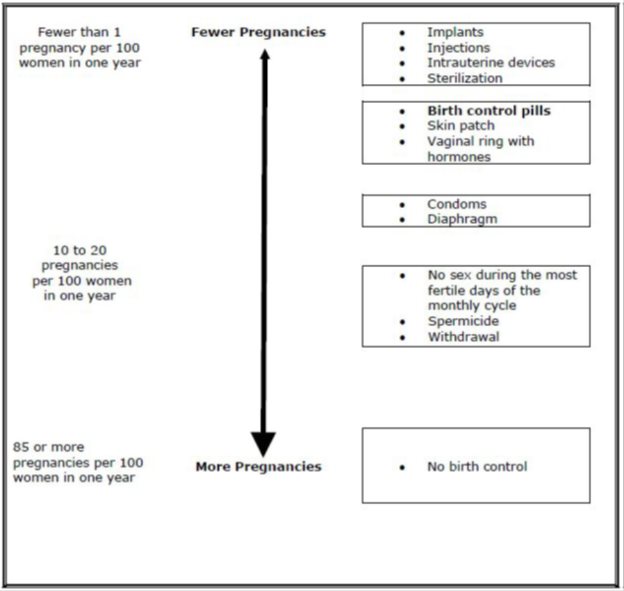
Who should not take Junel Fe 24?
Do not take Junel Fe 24 if you:
- smoke and are over 35 years of age
- had blood clots in your arms, legs, lungs, or eyes
- had a problem with your blood that makes it clot more than normal
- have certain heart valve problems or irregular heart beat that increases your risk of having blood clots
- had a stroke
- had a heart attack
- have high blood pressure that cannot be controlled by medicine
- have diabetes with kidney, eye, nerve, or blood vessel damage
- have certain kinds of severe migraine headaches with aura, numbness, weakness or changes in vision, or any migraine headaches if you are over 35 years of age
- have liver problems, including liver tumors
- have any unexplained vaginal bleeding
- had breast cancer
- take any Hepatitis C drug combination containing ombitasvir/paritaprevir/ritonavir, with or without dasabuvir. This may increase levels of the liver enzyme “alanine aminotransferase” (ALT) in the blood
If any of these conditions happen while you are taking Junel Fe 24, stop taking Junel Fe 24 right away and talk to your healthcare provider. Use non-hormonal contraception (such as condoms and spermicide) when you stop taking Junel Fe 24.
What should I tell my healthcare provider before taking Junel Fe 24?
Tell your healthcare provider if you:
- are pregnant or think you may be pregnant
- are depressed now or have been depressed in the past
- had yellowing of your skin or eyes (jaundice) caused by pregnancy (cholestasis of pregnancy)
- are breastfeeding or plan to breastfeed. Junel Fe 24 may decrease the amount of breast milk you make. A small amount of the hormones in Junel Fe 24 may pass into your breast milk. Talk to your healthcare provider about the best birth control method for you while breastfeeding.
Tell your healthcare provider about all the medicines you take, including prescription and over-the-counter medicines, vitamins and herbal supplements.
Junel Fe 24 may affect the way other medicines work, and other medicines may affect how well Junel Fe 24 works.
Know the medicines you take. Keep a list of them to show your healthcare provider and pharmacist when you get a new medicine.
How should I take Junel Fe 24?
Read the Instructions for Use at the end of this Patient Information.
What are the possible serious side effects of Junel Fe 24?
- Like pregnancy, Junel Fe 24 may cause serious side effects, including blood clots in your lungs, heart attack, or a stroke that may lead to death. Some other examples of serious blood clots include blood clots in the legs or eyes.
Serious blood clots can happen especially if you smoke, are obese, or are older than 35 years of age. Serious blood clots are more likely to happen when you:
- first start taking birth control pills
- restart the same or different birth control pills after not using them for a month or more
Call your healthcare provider or go to a hospital emergency room right away if you have:
|
|
|
|
|
|
|
Other serious side effects include:
-
liver problems, including:
- rare liver tumors
- jaundice (cholestasis), especially if you previously had cholestasis of pregnancy. Call your healthcare provider if you have yellowing of your skin or eyes.
- high blood pressure. You should see your healthcare provider for a yearly check of your blood pressure.
- gallbladder problems
- changes in the sugar and fat (cholesterol and triglycerides) levels in your blood
- new or worsening headaches including migraine headaches
- depression
- possible cancer in your breast and cervix
- swelling of your skin especially around your mouth, eyes, and in your throat (angioedema). Call your healthcare provider if you have a swollen face, lips, mouth tongue or throat, which may lead to difficulty swallowing or breathing. Your chance of having angioedema is higher is you have a history of angioedema.
- dark patches of skin around your forehead, nose, cheeks and around your mouth, especially during pregnancy (chloasma). Women who tend to get chloasma should avoid spending a long time in sunlight, tanning booths, and under sun lamps while taking Junel Fe 24. Use sunscreen if you have to be in the sunlight.
What are the most common side effects of Junel Fe 24?
- headache
- vaginal infections
- nausea
- menstrual cramps
- breast tenderness
- mood changes
- acne
- weight gain
These are not all the possible side effects of Junel Fe 24. For more information, ask your healthcare provider or pharmacist.
You may report side effects to the FDA at 1-800-FDA-1088.
What else should I know about taking Junel Fe 24?
- If you are scheduled for any lab tests, tell your healthcare provider you are taking Junel Fe 24. Certain blood tests may be affected by Junel Fe 24.
- Junel Fe 24 does not protect against HIV infection (AIDS) and other sexually transmitted infections.
How should I store Junel Fe 24?
- Store Junel Fe 24 at room temperature between (68° to 77°F) 20° to 25°C.
- Store away from light.
- Keep Junel Fe 24 and all medicines out of the reach of children.
General information about the safe and effective use of Junel Fe 24.
Medicines are sometimes prescribed for purposes other than those listed in a Patient Information leaflet. Do not use Junel Fe 24 for a condition for which it was not prescribed. Do not give Junel Fe 24 to other people.
This Patient Information summarizes the most important information about Junel Fe 24. You can ask your pharmacist or healthcare provider for information about Junel Fe 24 that is written for health professionals.
For more information, call Teva at 1-888-838-2872.
Do birth control pills cause cancer?
It is not known if hormonal birth control pills cause breast cancer. Some studies, but not all, suggest that there could be a slight increase in the risk of breast cancer among current users with longer duration of use.
If you have breast cancer now, or have had it in the past, do not use hormonal birth control because some breast cancers are sensitive to hormones.
Women who use birth control pills may have a slightly higher chance of getting cervical cancer. However, this may be due to other reasons such as having more sexual partners.
What if I want to become pregnant?
You may stop taking the pill whenever you wish. Consider a visit with your healthcare provider for a pre-pregnancy checkup before you stop taking the pill.
What should I know about my period when taking Junel Fe 24?
Your periods may be lighter and shorter than usual. Some women may miss a period. Irregular vaginal bleeding or spotting may happen while you are taking Junel Fe 24, especially during the first few months of use. This usually is not a serious problem. It is important to continue taking your pills on a regular schedule to prevent a pregnancy.
What are the ingredients in Junel Fe 24?
Active ingredients:
Light yellow pills: norethindrone acetate and ethinyl estradiol
Inactive ingredients:
Light yellow pills: acacia, compressible sugar, D&C yellow no. 10 aluminum lake, lactose monohydrate, magnesium stearate and pregelatinized corn starch
Brown pills: ferrous fumarate, crospovidone, hydrogenated vegetable oil and microcrystalline cellulose
Manufactured For:
Teva Pharmaceuticals USA, Inc.
North Wales, PA 19454
Rev. D 2/2024
INSTRUCTIONS FOR USE
Junel Fe 24 (Joo-nell Fe 24)
(norethindrone acetate and ethinyl estradiol tablets and ferrous fumarate tablets)
Important Information about taking Junel Fe 24
- Take 1 pill every day at the same time. Take the pills in the order directed on your pill dispenser.
- Do not skip your pills, even if you do not have sex often. If you miss pills (including starting the pack late), you could get pregnant. The more pills you miss, the more likely you are to get pregnant.
- If you have trouble remembering to take Junel Fe 24, talk to your healthcare provider.
- When you first start taking Junel Fe 24, spotting or light bleeding in between your periods may occur. Contact your healthcare provider if this does not go away after a few months.
- You may feel sick to your stomach (nauseous), especially during the first few months of taking Junel Fe 24. If you feel sick to your stomach, do not stop taking the pill. The problem will usually go away. If your nausea does not go away, call your healthcare provider.
- Missing pills can also cause spotting or light bleeding, even when you take the missed pills later. On the days you take 2 pills to make up for missed pills (see, What should I do if I miss any Junel Fe 24 pills? below), you could also feel a little sick to your stomach.
- It is not uncommon to miss a period. However, if you miss a period and have not taken Junel Fe 24 according to directions, or miss 2 periods in a row, or feel like you may be pregnant, call your healthcare provider. If you have a positive pregnancy test, you should stop taking Junel Fe 24.
- If you have vomiting or diarrhea within 3 to 4 hours of taking a light yellow active pill, take another light yellow pill from your extra pill dispenser. If you do not have an extra pill dispenser, take the next light yellow pill in your pill dispenser. Continue taking all your remaining pills in order. Start the first pill of your next pill dispenser the day after finishing your current pill dispenser. This will be 1 day earlier than originally scheduled. Continue on your new schedule.
- If you have vomiting or diarrhea for more than 1 day, your birth control pills may not work as well. Use an additional birth control method, like condoms and a spermicide, until you check with your healthcare provider.
- Stop taking Junel Fe 24 at least 4 weeks before you have major surgery and do not restart after the surgery without asking your healthcare provider. Be sure to use other forms of contraception (like condoms and spermicide) during this time period.
Before you start taking Junel Fe 24:
- Decide what time of day you want to take your pill. It is important to take it at the same time every day and in the order as directed on your pill dispenser.
- Have backup contraception (condoms and spermicide) available and if possible, an extra full pack of pills as needed.
When should I start taking Junel Fe 24?
If you start taking Junel Fe 24 and you have not used a hormonal birth control method before:
- There are 2 ways to start taking your birth control pills. You can either start on a Sunday (Sunday Start) or on the first day (Day 1) of your natural menstrual period (Day 1 Start). Your healthcare provider should tell you when to start taking your birth control pill.
- If you use the Sunday Start, use non-hormonal back-up contraception such as condoms and spermicide for the first 7 days that you take Junel Fe 24. You do not need back-up contraception if you use the Day 1 Start.
If you start taking Junel Fe 24 and you are switching from another birth control pill:
- Start your new Junel Fe 24 pack on the same day that you would start the next pack of your previous birth control method.
- Do not continue taking the pills from your previous birth control pack.
If you start taking Junel Fe 24 and previously used a vaginal ring or transdermal patch:
- Start using Junel Fe 24 on the day you would have reapplied the next ring or patch.
If you start taking Junel Fe 24 and you are switching from a progestin-only method such as an implant or injection:
- Start taking Junel Fe 24 on the day of removal of your implant or on the day when you would have had your next injection.
If you start taking Junel Fe 24 and you are switching from an intrauterine device or system (IUD or IUS):
- Start taking Junel Fe 24 on the day of removal of your IUD or IUS.
- You do not need back-up contraception if your IUD or IUS is removed on the first day (Day 1) of your period. If your IUD or IUS is removed on any other day, use non-hormonal back-up contraception such as condoms and spermicide for the first 7 days that you take Junel Fe 24.
Keep a calendar to track your period:
If this is the first time you are taking birth control pills, read, “When should I start taking Junel Fe 24?” above. Follow these instructions for either a Sunday Start or a Day 1 Start.
Sunday Start:
You will use a Sunday Start if your healthcare provider told you to take your first pill on a Sunday.
- Take pill 1 on the Sunday after your period starts.
- If your period starts on a Sunday, take pill “1” that day and refer to Day 1 Start instructions below.
- Take 1 pill every day in the order on the pill dispenser at the same time each day for 28 days.
- After taking the last pill on Day 28 from the pill dispenser, start taking the first pill from a new pack, on the same day of the week as the first pack (Sunday). Take the first pill in the new pack whether or not you are having your period.
- Use non-hormonal back-up contraception such as condoms and spermicide for the first 7 days of the first cycle that you take JUNEL FE 24.
Day 1 Start:
You will use a Day 1 Start if your doctor told you to take your first pill (Day 1) on the first day of your period.
- Take 1 pill every day in the order of the pill dispenser, at the same time each day, for 28 days.
- After taking the last pill on Day 28 from the pill dispenser, start taking the first pill from a new pack, on the same day of the week as the first pack. Take the first pill in the new pack whether or not you are having your period.
Instructions for using your pill pack:
The Junel Fe 24 pill pack has 24 "active" light yellow pills (with hormones) to be taken for 24 days, followed by 4 "reminder" brown pills (without hormones) to be taken for the next 4 days.
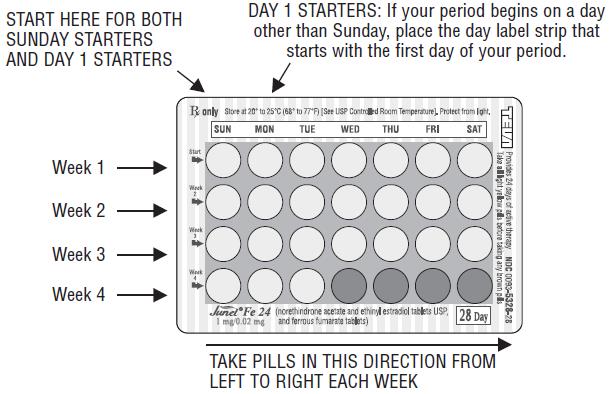
Figure A
Look for:
- Where on the pack to start taking pills
- In what order to take the pills. Follow the arrows shown in Figure A.
- The week numbers as shown in Figure A.
What should I do if I miss any Junel Fe 24 light yellow pills?
If you miss 1 light yellow pill in Weeks 1, 2, or 3, follow these steps:
- Take it as soon as you remember. Take the next pill at your regular time. This means you may take 2 pills in 1 day.
- Then continue taking 1 pill every day until you finish the pack.
- You do not need to use a back-up birth control method if you have sex.
If you miss 2 light yellow pills in a row in Week 1 or Week 2 of your pack, follow these steps:
- Take the 2 missed pills as soon as possible and the next 2 pills the next day.
- Then continue to take 1 pill every day until you finish the pack.
- Use a non-hormonal birth control method (such as a condom and spermicide) as a back-up if you have sex during the first 7 days after missing your pills.
If you miss 2 light yellow pills in a row in Week 3 or Week 4, or you miss 3 or more light yellow pills in a row at any time, follow these steps:
-
If you are a Day 1 Starter:
- Throw out the rest of the pill pack and start a new pack that same day.
-
If you are a Sunday Starter:
- Keep taking 1 pill every day until Sunday. On Sunday, throw out the rest of the pack and start a new pack of pills that same day.
- You may not have your period this month but this is expected. However, if you miss your period 2 months in a row, call your healthcare provider because you might be pregnant.
- You could become pregnant if you have sex during the first 7 days after you restart your pills. You MUST use a non-hormonal birth control method (such as a condom and spermicide) as a back-up if you have sex during the first 7 days after you restart your pills.
If you miss any of the 4 brown “reminder” pills in Week 4, throw away the pills you missed and keep taking 1 pill each day until the pack is empty. You do not need to use a back-up method of birth control.
If you have any questions or are unsure about the information in this leaflet, call your healthcare provider.
This Patient Information and Instructions for Use has been approved by the U.S. Food and Drug Administration.
Manufactured For:
Teva Pharmaceuticals USA, Inc.
North Wales, PA 19454
Rev. D 2/2024
Package/Label Display Panel
NDC 0093-5328-62
Three Blister Cards, 28 Tablets Each
Junel® Fe 24
(norethindrone acetate and ethinyl estradiol tablets USP 1 mg/0.02 mg and ferrous fumarate tablets*)
Pharmacist: Each foil pouch contains one combination “Patient Brief Summary/Detailed
Patient Package Insert,” which is to be provided to the patient with each prescription.
Provides 24 days of active therapy
Contains 3 blister cards, each containing a cycle of 28 tablets. Each of the light yellow
tablets contain norethindrone acetate, 1 mg and ethinyl estradiol, 0.02 mg. Each of the
4 brown tablets contain ferrous fumarate, 75 mg.
*Ferrous fumarate tablets are not USP for dissolution and assay.
Rx only
SHAPING
WOMEN’S HEALTH®
